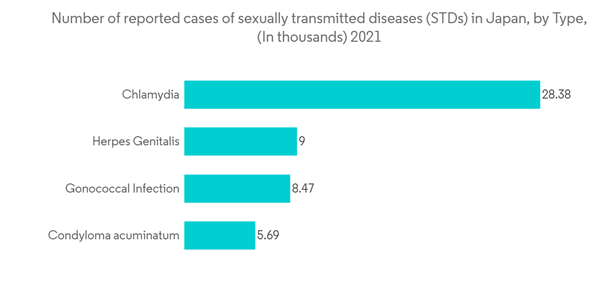Certain factors that are driving the market growth include the increasing awareness about sexually transmitted diseases (STDs) and the rising rate of unintended pregnancies.
The outbreak of COVID-19 has significantly impacted the contraceptives market value. The outbreak inflicted a substantial disease burden along with financial adversities that have impacted the economy. While during the coronavirus pandemic, millions of women and girls worldwide lost access to contraception and abortion services. Lockdowns, travel restrictions, supply chain disruptions, a massive shift of health resources to combat COVID-19, and the fear of infection had all contributed to an increase in the number of unintended pregnancies in the country. As a result of travel restrictions, the incidence of unsafe abortions in the country had led to rising pregnancy exponentially due to a lack of contraceptives. According to a report by the Condom Alliance 2020, condom sales in the country fell 52 percent during the lockdown period in 2020, with a projected full-year decline of 31 percent for FY2021. Thus, Covid-19 has had a significant impact on the market for contraceptive devices.
According to the United Nations Department of Economic and Social Affairs, estimated that in 2020, the contraception usage among the female Japanese population stood at around 56.6 percent and this percentage is expected to reach 62.5 percent by 2030. Moreover, initiatives by the government to raise awareness regarding contraceptives and family planning have also helped the growth of the market. Thus, owing to the above-mentioned factors it is expected to drive market growth. While the increasing burden of sexually transmitted diseases in Japan is further propelling the market growth. For instance , In April 2020, around 28.4 thousand cases of chlamydia were reported by medical institutions in Japan, representing the highest number in the last decade, and at the same time making it the most common STD of Japan. In the same year, the recorded cases of herpes genitalis amounted to exactly nine thousand.
Thus, the aforementioned reasons are driving the market growth.
Japan Contraceptive Devices Market Trends
Condoms are Expected to Dominate the Market Over the Forecast Period
A condom is a sheath-shaped barrier device that is being used during sexual intercourse to reduce the probability of pregnancy or a sexually transmitted infection (STI). There are both male and female condoms available in the market. Their use greatly decreases the risk of gonorrhea, chlamydia, trichomoniasis, hepatitis B, and HIV/AIDS. They also to a lesser extent protect against genital herpes, human papillomavirus (HPV), and syphilis.Moreover, in Japan, Okamoto Industries has the widest condom range. In 2020, Okamoto in collaboration with Condomania is also debuting Japanese-themed condoms, as well as the world's first condoms coated with a special microbicide that has been shown in medical studies to inactivate up to 99.9 percent of HIV, HSV, and HPV. Thus, considering the above-mentioned factors it is expected to show significant growth shortly.
The government in Japan is introducing different campaigns and comprehensive sex education programs to improve awareness among youth and encourage them to use contraceptives in order to combat STDs and prevent unwanted pregnancies. In Japan, the Ministry of Health and Family Welfare procures condoms that are distributed by NACO/SACS to high-risk groups (HRGs) via TI NGOs/ICTC/ART centres for HIV/AIDS prevention. Whereas, in the National Department of Health (NDOH) is working to ensure that male condoms are readily available in all communities throughout the region.
Thus, the aforementioned factors are propelling the growth of the market.
Japan Contraceptive Devices Industry Overview
The Japan Contraceptive Devices Market is fragmented in nature. Moreover, Japan has been witnessing the emergence of some small players due to presence of high awareness. This has also helped the studied market to grow. Some of the market players include Reckitt Benckiser, Cooper Surgical Inc., Abbvie Inc (Allergan PLC), Merck & Co., Inc, Mylan Laboratories, Okamoto Industries, Inc, Pfizer Inc., and Bayer AG.Additional Benefits:
- The market estimate (ME) sheet in Excel format
- 3 months of analyst support
This product will be delivered within 2 business days.
Table of Contents
Companies Mentioned (Partial List)
A selection of companies mentioned in this report includes, but is not limited to:
- Reckitt Benckiser
- Cooper Surgical Inc.
- Abbvie Inc (Allergan PLC)
- Merck & Co., Inc
- Bayer AG
- Mylan Laboratories
- Okamoto Industries, Inc
- Pfizer Inc.









